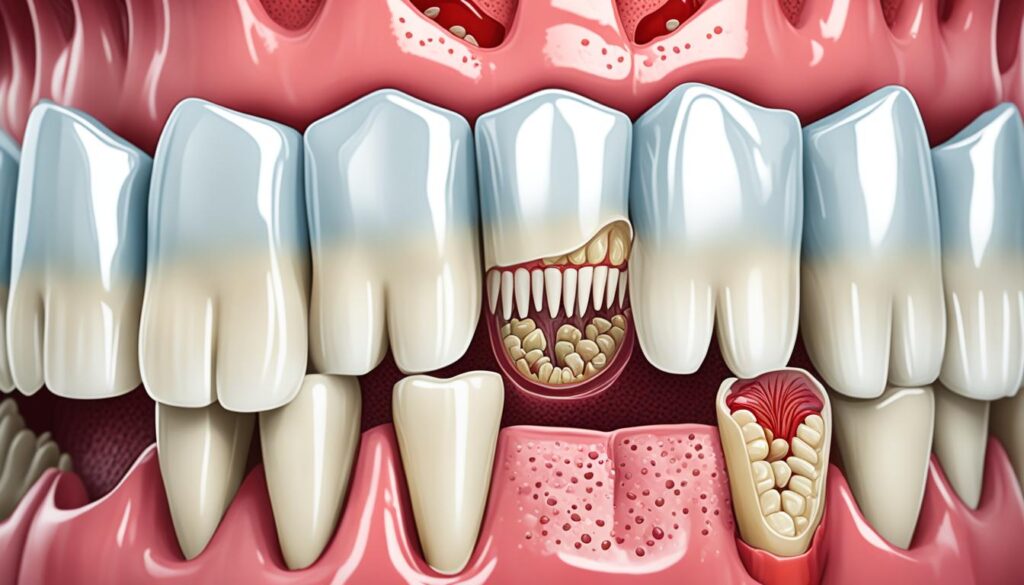Heartwarming Health: Caring for Your Dog’s Heart

Did you know that heart disease affects dogs differently than humans? It’s true! Conditions like congestive heart failure can be a concern in aging canines, making it imperative for pet owners to prioritize dog heart health. Taking care of your dog’s heart is essential for their overall well-being and longevity. In this article, we will provide expert tips on how to keep your furry friend’s heart healthy and strong.
Key Takeaways:
- Follow guidelines for a healthy diet to support your dog’s heart health.
- Regular exercise helps maintain a healthy weight and promotes cardiovascular health.
- Schedule frequent veterinary exams to monitor your dog’s heart health and catch any potential issues early.
- Prioritize dental care to prevent oral infections that can impact the heart.
- Be aware of your dog’s breed predispositions and take necessary precautions.
Feeding a Healthy Diet
A healthy body begins with a healthy diet. Nutrition plays a major role in supporting overall health, including heart health, in dogs. It is important to prioritize balanced nutrition for your furry friend to promote their well-being and reduce the risk of heart-related issues.
Choosing a high-quality dog food is crucial to ensure your dog receives the necessary nutrients. Look for dog food brands that provide a balanced mix of proteins, carbohydrates, fats, vitamins, and minerals. Avoid foods that contain excessive artificial ingredients, fillers, or preservatives.
Obesity is a significant concern in dogs and can have detrimental effects on the heart. Overfeeding and excessive treats can contribute to weight gain, increasing the risk of cardiovascular problems. It’s essential to measure your dog’s food portions according to their age, size, and activity level. Minimize treats and opt for healthy alternatives like carrots or blueberries for occasional rewards.
If you’re unsure about the appropriate diet for your dog, consult your veterinarian. They can provide personalized guidance based on your dog’s specific needs and help you establish a healthy meal plan.
Did You Know?
The Link Between Obesity and Heart Disease: Obesity is the primary cause of numerous health issues in dogs, including cardiovascular diseases. Maintaining a healthy weight through proper diet and exercise is crucial to reduce the risk and severity of heart-related problems.
Providing Exercise
Regular exercise is essential for your dog’s overall health, including their heart health. Dogs thrive on physical activity and enjoy a variety of cardio exercises that keep their hearts pumping and their bodies in shape.
- Walking: Taking your dog for daily walks is a simple yet effective way to provide them with exercise. Not only does it get their heart rate up, but it also allows them to explore their surroundings and experience mental stimulation.
- Running: If you have an active dog, jogging or running together can be a great way to exercise both of you. Find a safe, dog-friendly route and gradually increase the distance and intensity as your dog builds stamina.
- Swimming: Swimming is a low-impact exercise that is gentle on the joints while providing a full-body workout. If your dog enjoys the water, consider taking them to a dog-friendly beach or a supervised swimming pool.
- Agility: Training your dog in agility courses not only provides physical exercise but also mental stimulation. It involves navigating through obstacles, tunnels, and jumps, giving your dog a fun challenge.
“Regular exercise is vital for maintaining cardiovascular health in dogs. It helps improve circulation, strengthens the heart muscle, and reduces the risk of obesity, which is a risk factor for heart disease.”
– Dr. Sarah Johnson, Veterinarian
Remember to tailor the exercise routine according to your dog’s age, breed, and overall health. If you’re unsure about the ideal exercise regimen, consult with your veterinarian for personalized advice and recommendations.

The Benefits of Exercise for Your Dog’s Heart
Engaging in regular cardiovascular exercise plays a significant role in maintaining your dog’s heart health. Some key benefits of exercise for your furry friend include:
- Improved circulation and oxygen delivery to the body tissues.
- Strengthened heart muscles, enhancing cardiac function.
- Maintained healthy weight and body composition.
- Enhanced mental stimulation and reduced behavioral problems.
- Reduced risk of developing heart disease and other chronic conditions.
Scheduling Veterinary Exams
Regular veterinary exams are crucial for monitoring your dog’s health, especially as they age. Dogs age much faster than humans, so it is recommended to schedule at least bi-annual visits with the vet. These exams allow the vet to catch any potential heart problems early and provide appropriate care and treatment.
During a dog check-up, your veterinarian will assess several aspects of your pet’s overall health, including their heart function. They will listen to your dog’s heart using a stethoscope to detect any irregularities or abnormalities in the heartbeat. Your vet may also perform additional tests, such as blood work or an electrocardiogram, to further evaluate your dog’s heart health.
Senior dog care is especially important when it comes to heart health. As dogs age, their risk of developing heart disease increases. Regular check-ups can help detect signs of heart disease early on, allowing for timely intervention and management. Your vet may recommend specific interventions or medications to support your senior dog’s heart health and overall well-being.
“Regular veterinary exams are crucial for monitoring your dog’s health, especially as they age.”
Scheduling bi-annual visits with your vet not only helps to address your dog’s heart health but also ensures a comprehensive assessment of their overall well-being. In addition to heart health, your vet will examine other vital aspects, such as dental health, joint function, weight management, and vaccinations.
Benefits of Bi-Annual Vet Visits for Senior Dogs
Bi-annual veterinary exams offer several benefits for senior dogs:
- Early detection of heart disease or other health conditions
- Prompt treatment and management of existing conditions
- Opportunity to discuss any concerns or changes in your dog’s behavior or health
- Monitoring of medication effectiveness and potential adjustments
- Prevention and treatment of dental issues that can impact heart health
By prioritizing regular check-ups and senior dog care, you can provide your furry friend with the best chance of maintaining a healthy heart and enjoying a high quality of life.
Prioritizing Dental Care
Dental care is not just important for maintaining a dog’s oral health, but it also plays a crucial role in their overall well-being, including heart health. Dental disease in dogs, such as periodontal disease and gum infections, can have a direct impact on their heart, potentially leading to serious conditions like congestive heart failure.
In a dog’s mouth, there are millions of bacteria that can cause inflammation and infection. When dental disease is left untreated, these bacteria can enter the bloodstream, spreading throughout the body, including the heart. This can contribute to the development of cardiovascular problems and increase the risk of heart disease.
To prevent these heart-related issues, it is essential to prioritize your dog’s dental care. Establishing a regular dental care routine can significantly reduce the risk of dental disease and its potential impact on the heart. Here are some key steps to follow:
- Regular Brushing: Brush your dog’s teeth at least 2-3 times a week using a dog-specific toothbrush and toothpaste. This helps remove plaque and prevent the buildup of tartar, reducing the risk of gum disease and bacterial infections.
- Professional Dental Cleanings: Schedule regular professional cleanings with your veterinarian. These cleanings involve a thorough examination, removal of plaque and tartar, and addressing any dental issues. Your vet can recommend the appropriate frequency based on your dog’s specific needs.
- Dental Chews and Toys: Provide dental chews or toys designed to promote oral health. These can help reduce plaque and tartar buildup while keeping your dog’s teeth and gums healthy.
- Dietary Considerations: Choose a high-quality dog food that promotes dental health. Look for options that are specifically formulated to support oral hygiene.
- Regular Check-ups: Keep an eye out for signs of dental problems in your dog, such as bad breath, loose or discolored teeth, swelling or bleeding gums, difficulty chewing, and excessive drooling. If you notice any of these signs, contact your vet for a dental examination.
By prioritizing your dog’s dental care, you can help maintain their oral health and reduce the risk of dental disease-related heart problems. Remember to consult with your veterinarian for personalized advice and guidance on maintaining your dog’s dental health.

Canine Oral Health Tips:
“Taking care of your dog’s teeth doesn’t only result in fresh breath but also reduces the risk of heart disease. Make dental care a priority to ensure your furry companion lives a long and healthy life.” – Dr. Emma Johnson, DVM
Conclusion
Caring for your dog’s heart is crucial for their overall well-being. By implementing these dog heart health tips, you can ensure that your furry friend enjoys a long and healthy life by your side.
First and foremost, provide a healthy diet that is well-balanced and tailored to your dog’s specific needs. Consult your veterinarian for guidance in selecting the right dog food and avoiding obesity, which can be harmful to their heart.
Regular exercise is vital for your dog’s cardiovascular health. Engage them in activities like walking, running, swimming, or agility exercises to keep their heart pumping and maintain a healthy weight.
When it comes to their healthcare, schedule regular veterinary check-ups, especially for senior dogs. Bi-annual visits allow the vet to monitor your dog’s heart health, detect any early signs of cardiac issues, and provide appropriate care and treatment.
Another aspect to prioritize is dental care. Poor oral hygiene can lead to dental disease, which is linked to heart problems. Maintain a regular dental care routine, including brushing and professional cleanings, to prevent any potential heart-related complications.
Furthermore, ensure your dog is protected against heartworm disease by following the preventive measures recommended by your vet.
Last but not least, be aware of your dog’s breed predispositions to certain heart conditions and discuss any concerns with your veterinarian. They can provide valuable advice and guidance tailored to your dog’s specific needs.
Remember, consulting your veterinarian is vital for personalized advice and care. By following these canine cardiac care tips and working closely with your vet, you can help ensure that your beloved companion enjoys a healthy heart and a happy life.
FAQ
How does heart disease affect dogs?
Heart disease affects dogs differently than humans, with conditions like congestive heart failure being a concern in aging canines.
What role does diet play in a dog’s heart health?
Nutrition plays a major role in supporting overall health, including heart health, in dogs. It is important to choose a balanced, high-quality dog food and minimize treats to avoid obesity, which can be detrimental to the heart.
How important is exercise for a dog’s heart health?
Regular exercise is essential for your dog’s overall health, including their heart health. Dogs love cardio activities like walking, running, swimming, and agility. It is important to ensure that your dog gets enough physical activity to keep their heart pumping and maintain a healthy weight.
How often should I take my dog for veterinary exams?
Regular veterinary exams are crucial for monitoring your dog’s health, especially as they age. Dogs age much faster than humans, so it is recommended to schedule at least bi-annual visits with the vet. These exams allow the vet to catch any potential heart problems early and provide appropriate care and treatment.
How does dental care relate to a dog’s heart health?
Dental care is important for overall health, including heart health. Dental disease can contribute to congestive heart failure, as the bacteria and infection in a dog’s mouth can enter the bloodstream. Maintaining a healthy dental care routine, including regular brushing and professional cleanings, can help prevent heart-related issues.
How can I ensure my dog has a healthy heart?
Caring for your dog’s heart is essential for their overall well-being. By following the tips mentioned in this article, such as feeding a healthy diet, providing exercise, scheduling regular vet exams, prioritizing dental care, preventing heartworm disease, and being aware of breed predispositions, you can ensure that your furry friend has a healthy heart and many more years by your side. Remember to always consult with your veterinarian for personalized advice and guidance regarding your dog’s specific needs.